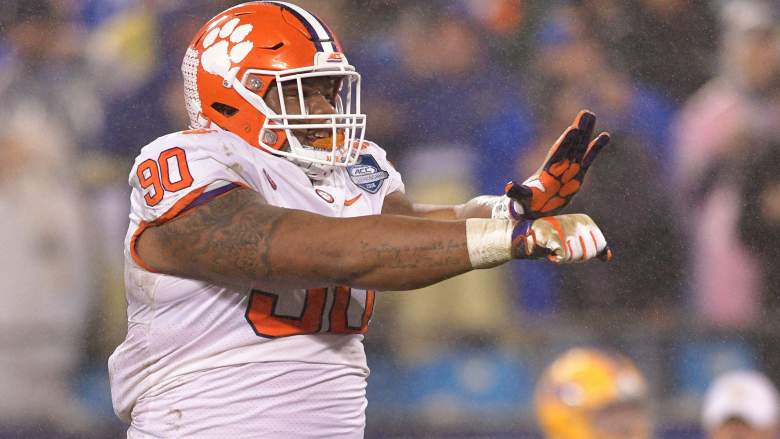
Clemson will be without Dexter Lawrence for the remainder of the season as the defensive tackle failed a recent drug test. According to ESPN, Lawrence tested positive for ostarine, which is a substance not on the Food and Drug Administration’s approved list. Lawrence also failed the B test sample per The Athletic’s Matt Fortuna.
Here’s how the U.S. Anti-Doping Agency defines ostarine.
Ostarine is the trademarked name for a Selective Androgen Receptor Modulator (SARM) that is not approved for human use or consumption in the U.S., or in any other country. In recent years, WADA has reported an increasing number of positive tests involving SARMs, and athletes who use these substances most likely obtain them through black market channels.
Research has shown that SARMs like ostarine have fewer androgenic properties, meaning they have less influence on the development and balance of male hormones, including testosterone. While they are not yet approved for human use, SARMs are of interest to the medical community because they might be effective at treating different health conditions without resulting in the negative side effects of steroids. Ostarine is currently being investigated as a way to treat a variety of muscle wasting diseases, such as osteoporosis, cancer, and hypogonadism.
Dexter Lawrence Tested Positive for Ostarine & Has Likely Played His Final Game at Clemson
Lawrence denied knowingly taking the supplement and the Clemson coaching staff has backed up his claim. Clemson tight end Braden Galloway and offensive lineman Zach Giella also tested positive for the same substance. According to ESPN, the three players are potentially facing a year suspension, but Lawrence is likely headed to the NFL draft.
“I don’t know where it came from, how it got there,” Lawrence told The State. “I was raised different. If I did do it, I’d own up to it, but all I can say is I honestly don’t know what happened or how it got in. It’s just there. There’s nothing I can really do about it…I was looking at my phone like, ‘Are you crazy? What’s wrong with you [Dabo Swinney] for asking something like that?’ The next thing you know he tells me I tested positive for something I’ve never heard of or know where to get it. I can say I’m not the type of guy to do a selfish act like that. I have too much pride. I love this team and my family too much to even think about putting a substance like that in my body.”
According to ESPN, Clemson is investigating how the players could have consumed the substance.
Meanwhile, coach Dabo Swinney said the school was investigating potential ways the substance could have been consumed without knowledge by the suspended players, including looking at supplements, treatment including its salt-water float pool and aspects of treatment Lawrence received following offseason surgery.
The substance, ostarine, is not approved by the Food and Drug Administration and is not legally for sale in the United States. There have been instances, however, of the drug being used in supplements without being included on the label. Clemson players said this week that the school closely monitors what supplements are made available to players, and all players have a list of what has been approved by the training staff.
Could Lawrence have unknowingly taken an approved supplement that contained ostarine? Here’s how the U.S. Anti-Doping Agency describes what kind of products typically contain ostarine.
There are in fact products that contain ostarine, but only illegal ones. Given that ostarine is not approved for human use or consumption in the U.S., or in any other country, there are no legal medications that contain ostarine.
It’s also important to note that ostarine is not a permitted ingredient in dietary supplements. However, you should be aware that some dietary supplement manufacturers illegally put SARMs like ostarine in their products and sell them as “legal steroids” or “research only” chemicals. Moreover, they may omit ostarine from the label entirely, or use misleading names to confuse consumers. For example, ostarine may also be called enobosarm, MK-2866, or GTx-024. Some examples of supplements that contain ostarine can be found on the USADA High Risk List. Click here for an advisory on ostarine in supplements.
READ NEXT: Trevor Lawrence NFL Draft: Clemson QB Projected to Be No. 1 Pick in 2021
Comments
Dexter Lawrence Suspended: What Drug Did Clemson DT Test Positive For Taking?